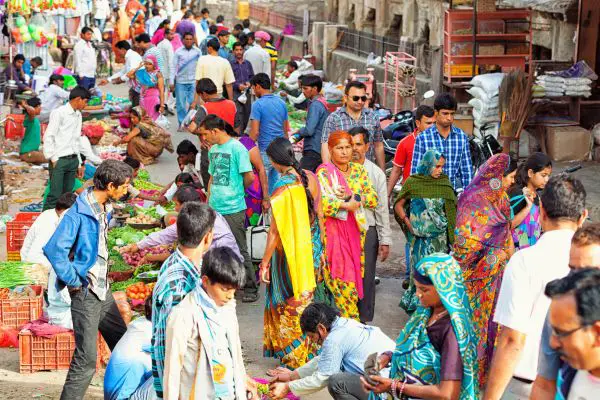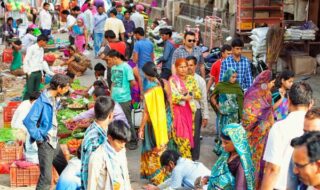
A crowd of people in India
Welcome to India, a country known for its magnificent beauty, historical wonders, and various cultures that attract travellers from all over the world. India offers a diverse range of activities, from visiting awe-inspiring landmarks such as the Taj Mahal and the sacred Ganges River to engaging in a gastronomic voyage of spicy delights and delectable cuisines.
Take part in the vibrant festivals, observe the fascinating customs, and experience the friendly welcome of the locals. However, amidst the enchantment, visitors should be wary of potential tourist fraud in some areas of this otherwise charming country.
While India welcomes travelers, it is vital to be cautious and aware of common tourist scams. Although scams can be quite common in many countries, understanding the common scams in India helps educate travelers to become aware and vigilant before it’s too late.
Table of Contents
Identifying traits and characteristics of scammers
Scammers come in various shapes and sizes, but these are the common characteristics of fraudsters that target tourists in India and in many other places.
They are excessively friendly and helpful
Scammers may look extremely polite and eager to help, approaching you unexpectedly with offers of assistance, instructions, or blessings. A stranger at a train station may insist on carrying your luggage or assisting you with ticket purchases, stating that the official counters are closed.
They are pushy and insistent
Swindlers can be persistent and persuasive, utilising emotional manipulation or pressure tactics to make you feel compelled to interact with them. A street hawker may aggressively sell costly souvenirs or insist on showing you “special” deals hidden in back alleys.
They operate in unofficial capacity
Scammers frequently operate outside of formal channels, setting up shop in unauthorised locations or contacting you on the street instead of legitimate enterprises. They can be money changers advertising “better rates” on the street corner or imposters conducting rituals outside temples.
They provide vague and unclear information
Scammers may present ambiguous or contradictory information about costs, services, or locations, frequently fabricating stories or employing intricate strategies to confuse you. As an example, consider a taxi driver proposing a “discounted fare” while driving a longer, more expensive route, or a guide claiming to know about a “secret temple” that does not exist.
They pressure you to act quickly
Scammers frequently create a sense of urgency, pressing you to make judgements or take action before you have a chance to think critically. A street hawker stating that a fantastic bargain is going to expire or a fraudulent advisor insisting you must move quickly to acquire train tickets.
Common scams that target tourists in India
Pickpocketing and scams done in tandem
Pickpocketing and other tourist-targeting frauds are unfortunately frequent in India’s tourist sites, particularly in congested locations such as markets, public transportation hubs, and major tourist attractions.
One example of a scam is when crooks use diversion techniques to steal items from naive tourists. For example, a criminal and an accomplice might work together, with one causing a fuss or asking for directions while the other quickly pickpockets the distracted visitor. Another approach involves someone pretending to assist the visitor, such as with luggage or directions, while secretly stealing from their pockets or bags.
To defend yourself from these scams, you must remain watchful and take preventative actions. First, stay aware of your surroundings and keep a tight eye on your valuables, especially in crowded areas.
Consider using a money belt or hidden pouch to keep your valuables secure and less accessible to pickpockets. Avoid flaunting huge sums of money or luxury objects in public, as this may draw unwelcome attention.
Furthermore, be wary of people who offer unsolicited help or engage in overly nice chat, especially if they appear persistent or anxious to become close to you. If you are a victim of pickpocketing or a similar scam, report it to local authorities right away and cancel any stolen credit cards or identification documents to avoid additional harm.
Scammers behind beggars
Begging scams that target tourists are unfortunately common in many parts of India, particularly in tourist-friendly places such as prominent sites, markets, and transit hubs. One prominent form of such a fraud is organised begging rings that take advantage of tourists’ generosity and sympathy.
Members of these rings, including women and children, frequently approach travellers with terrible stories or fabricated disabilities, offering money or food. Sometimes these beggars use props like bandages or faux wounds to elicit more compassion and cash. However, the money gathered rarely reaches the beggars themselves, instead going to organisers who take advantage of their poor circumstances.
When beggars approach tourists, they must exercise caution and common sense to avoid falling prey to begging scams. While it is normal to feel empathy for individuals in need, it is critical to be aware of the likelihood of scams and avoid contributing to exploitative behavior.
Instead of giving money directly to beggars, consider supporting trustworthy charities or organisations that aim to address the underlying causes of poverty and create long-term solutions. Furthermore, if you encounter persistent or violent beggars, avoid engaging with them and walk away gently.
Fake QR Codes
Imagine touring India’s lively bazaars, enthralled by the spices, textiles, and bustling energy. Suddenly, a kind local directs you to a “special offer” buried beneath an old QR code written on the wall. This seemingly harmless code could lead to a fantastic deal—or a horrific fraud.
Fake QR code frauds have become a sophisticated tool in the arsenal of Indian swindlers, primarily targeting gullible tourists. These dangerous scripts can lead to a range of risks, including phishing attacks and the exposure of sensitive information to malware.
A man contacted a group of tourists who were visiting Goa in 2019 and offered them “discounted taxi fares” via QR code. Intrigued, they scanned it, unintentionally installing malware that intercepted their bank transactions. By the time they realised what was going on, thousands of rupees had disappeared from their accounts.
Before scanning, hover your phone over the code to see what URL it leads to. Look for strange or misspelt domain names, and never provide personal information on a website accessed via a scanned code. Only scan QR codes from reputable sources, such as official tourism websites or verified establishments. If a code appears suspicious, is posted on a random wall, or is offered by an extremely eager individual, walk away.
Scammers who use religion, faith and karma
Imagine yourself in front of a magnificent temple, amidst the aroma of incense and the murmur of prayers. A seemingly devout man approaches, claiming to be a priest or astrologer with unique insights into your fate. They might weave complex tales about curses, bad karma, or opportunities that demand expensive rituals or substantial payments to access.
In 2018, a man acting as a temple priest approached a group of Western tourists in Varanasi. He convinced them that they were cursed and needed expensive pujas and offerings to please deities and erase the negative. They wound up spending hundreds of dollars before realising they had been duped.
To avoid being scammed, Before visiting holy sites, familiarize yourself with the local customs and etiquette. Dress modestly, be respectful, and avoid engaging with anyone who offers unsolicited blessings or advice. Purchase offerings and tickets only at the official counters throughout the temple complex. Be aware of anyone seeking money outside of the specified zones. Trust your intuition. If something feels odd, such as pressure to pay huge amounts of money or participate in unusual rituals, respectfully excuse yourself and go away.

The ‘friendship bracelet’ trap
A seemingly pleasant local insists on wrapping a “blessing bracelet” around your wrist. Before you know it, they demand an expensive payment, transforming a supposed gesture of goodwill into a coerced transaction. In 2021, a couple visiting Jaipur was captivated by a little girl selling jewellery.
They politely declined it, but she persisted, tying them up without permission and demanding 1000 rupees each. To prevent a disturbance, they eventually had to negotiate a lesser price.
The unhelpful ‘guide’
In crowded train stations, kind individuals try to “help” buy tickets, claiming that official counters are closed or tickets are sold out. They charge exorbitant charges or direct you to fraudulent ticket offices, leaving you stuck and scammed.
In 2022, a tourist in Delhi fell victim to such a fraud, paying twice the amount for a train ticket and missing his scheduled departure.
Who are the most common victims who fall prey to India scams?
Uninformed tourists
Tourists who lack knowledge about local customs, prices, and typical scams are more susceptible. For example, an uninformed tourist may not know the standard taxi fares and pay much more than necessary.
Overtrustful tourists
Trusting everyone they encounter, over-trustful tourists may fall prey to scammers offering fake deals or services. For instance, they might believe a tout’s claim of securing them a luxurious hotel at a low price, only to find themselves in substandard accommodation.
Hasty tourists
Rushed travelers eager to explore multiple destinations quickly may not take the time to research local scams. Scammers exploit this haste, convincing them to pay upfront for sightseeing tours that turn out to be poorly organized or non-existent.
Non-speakers of local language
Tourists who don’t speak the local language might find it challenging to discern deceptive conversations. This lack of communication can lead to misunderstandings and falling for scams like misleading directions or being overcharged at markets.
Solo travelers
They may be targeted more often, as scammers perceive them as easier targets than larger groups. Examples include beggars approaching solo travelers and making up urgent needs in order to get money.
First-time visitors to India
First-time visitors are often unfamiliar with the country’s diverse culture and practices. They may be overwhelmed by new experiences, making them more susceptible to scams such as the infamous “gem scam,” where tourists are persuaded to purchase fake gemstones at high prices.
Fatigued and jet-lagged tourists
Tourists who have just arrived in India, suffering from jet lag or exhaustion, may not be in the best state to make informed decisions. Scammers may exploit their tiredness and confusion through various scams, including inflated transportation fares or fake tour packages.
What to do if you are a victim of a scam
Tourists who are victims of scams in India and need police assistance can take many steps to find the local police station and report the event. To begin, tourists might ask residents or employees at nearby businesses, hotels, or tourist information centres for directions to the nearest police station.
Many popular tourist destinations in India have specialised tourist police stations or help desks where visitors can seek aid and instruction in the event of an emergency or incident. These kiosks frequently have information about neighbouring police stations and can be extremely helpful to tourists navigating foreign legal procedures.
Furthermore, tourists can use mobile apps or other tools to find police stations in their area. Several smartphone apps and websites offer maps and directories of police stations around India, allowing travellers to find the nearest station based on their present location.
These platforms frequently contain contact information, addresses, and user evaluations, assisting tourists in determining the most accessible and credible methods for contacting law enforcement. Using these resources and seeking assistance from local authorities, tourists can efficiently report scams and receive the assistance they require to address their problems while visiting India.








